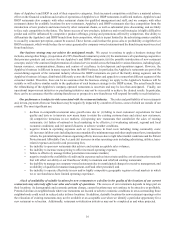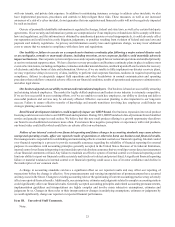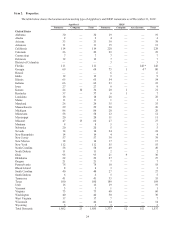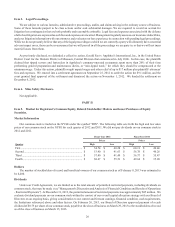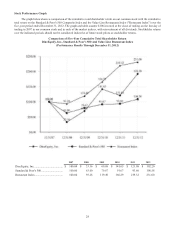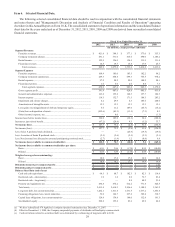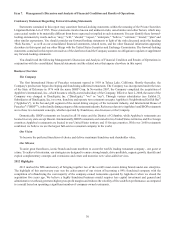IHOP 2012 Annual Report Download - page 38
Download and view the complete annual report
Please find page 38 of the 2012 IHOP annual report below. You can navigate through the pages in the report by either clicking on the pages listed below, or by using the keyword search tool below to find specific information within the annual report.20
Finally, we are subject to federal regulation and certain state laws which govern the offer and sale of franchises. Many state
franchise laws contain provisions that supersede the terms of franchise agreements, including provisions concerning the termination
or non-renewal of a franchise. Some state franchise laws require that certain materials be registered before franchises can be offered
or sold in that state. The failure to obtain or retain licenses or approvals to sell franchises could adversely affect us and the
franchisees. Changes in, and the cost of compliance with, government regulations could have a material effect on operations.
Restaurant development plans under development agreements may not be implemented effectively. We rely on franchisees
to develop Applebee's and IHOP restaurants. Restaurant development involves substantial risks, including the following:
• the availability of suitable locations and terms for potential development sites;
• the ability of franchisees to fulfill their commitments to build new restaurants in the numbers and the time frames specified
in their development agreements;
• the availability of financing, at acceptable rates and terms, to both franchisees and third-party landlords, for restaurant
development;
• delays in obtaining construction permits and in completion of construction;
• developed properties not achieving desired revenue or cash flow levels once opened;
• competition for suitable development sites;
• changes in governmental rules, regulations, and interpretations (including interpretations of the requirements of the
Americans with Disabilities Act); and
• general economic and business conditions.
We cannot assure that the development and construction of facilities will be completed, or that any such development will be
completed in a timely manner. We cannot assure that present or future development plans will perform in accordance with our
expectations.
The opening and success of Applebee's and IHOP restaurants depend on various factors, including the demand for Applebee's
and IHOP restaurants and the selection of appropriate franchisee candidates, the availability of suitable sites, the negotiation of
acceptable lease or purchase terms for new locations, costs of construction, permit issuance and regulatory compliance, the ability
to meet construction schedules, the availability of financing and other capabilities of franchisees. There is no assurance that
franchisees planning the opening of restaurants will have the business abilities or sufficient access to financial resources necessary
to open the restaurants required by their agreements. It cannot be assured that franchisees will successfully participate in our
strategic initiatives or operate their restaurants in a manner consistent with our concepts and standards.
Approximately 99% of our restaurants are owned and operated by our franchisees and, as a result, we are highly dependent
upon our franchisees. We have significantly increased the percentage of restaurants owned and operated by our franchisees. As
a result, we expect to receive less revenue from company restaurant sales and any increase in general and administrative expenses
may have a greater impact on our financial condition and business results. While our franchise agreements are designed to maintain
brand consistency, this increase in the franchised-operated restaurants reduces our direct day-to-day control over these restaurants
and may expose us to risks not otherwise encountered if we maintained ownership and control of the restaurants. These risks
include franchisee defaults in their obligations to us arising from financial or other difficulties encountered by them, such as
payments to us or maintenance and improvement obligations; limitations on enforcement of franchise obligations due to bankruptcy
or insolvency proceedings; unwillingness of franchisees to support our marketing programs and strategic initiatives; inability to
participate in business strategy changes due to financial constraints; inability to meet rent obligations on leases on which we retain
contingent liability; failure to operate restaurants in accordance with required standards; failure to report sales information
accurately; efforts by one or more large franchisees or an organized franchise association to cause poor franchise relations; and
failure to comply with food quality and preparation requirements subjecting us to potential losses even when we are not legally
liable for a franchisee's actions or failure to act. Although we believe that our current relationships with our franchisees are
generally good, there can be no assurance that we will maintain strong franchise relationships. Our dependence on franchisees
could adversely affect us, our reputation and our brands, and could adversely affect our business, financial condition and results
of operations.
Concentration of Applebee's franchised restaurants in a limited number of franchisees subjects us to greater credit risk. As
of December 31, 2012, Applebee's franchisees operated 1,862 Applebee's restaurants in the United States, comprising 99% of the
total Applebee's restaurants in the United States. Of those restaurants, the twelve largest Applebee's franchisees owned 1,280
restaurants, representing 69% of all franchised Applebee's restaurants in the United States. The concentration of franchised
restaurants in a limited number of franchisees subjects us to a potentially higher level of credit risk in respect of such franchisees
because their financial obligations to us are greater as compared to those franchisees with fewer restaurants. The risk associated
with these franchisees is also greater where franchisees are the sole or dominant franchisee for a particular region of the United
States, as is the case for most domestic Applebee's franchised territories. In particular, if any of these franchisees experiences
financial or other difficulties, the franchisee may default on its obligations under multiple franchise agreements including payments
to us and the maintenance and improvement of its restaurants. If any of these franchisees are subject to bankruptcy or insolvency








